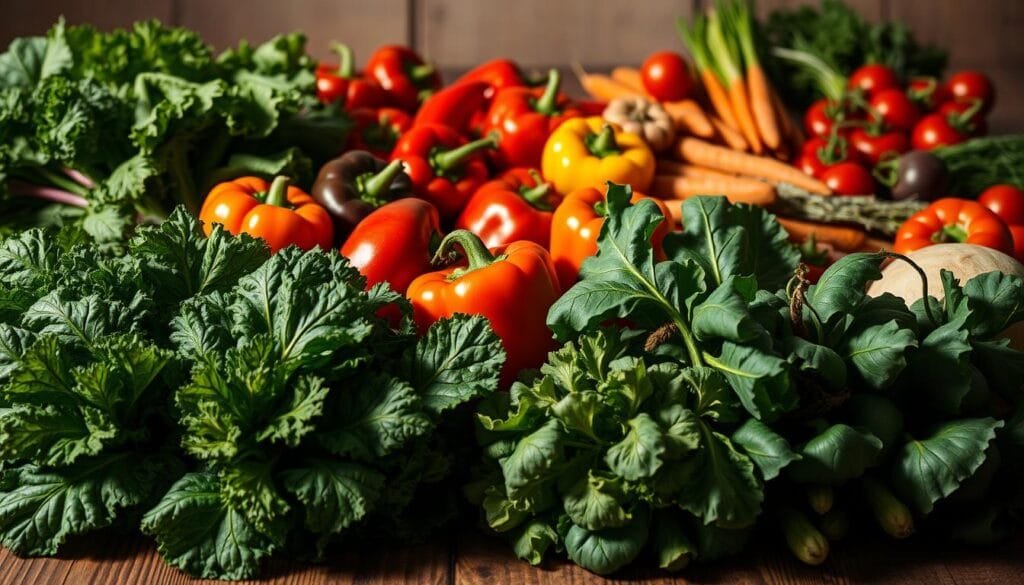Currently Empty: RM0.00
Did you know that some studies suggest beta-carotene supplements might increase certain health risks? This surprising fact highlights the complexity of this nutrient’s role in wellness. While natural sources like carrots and sweet potatoes offer benefits, research shows inconsistent results when taken as pills.
Wellness Concept, a trusted Malaysian health resource with over 15 years of expertise, provides clarity on this topic. Their team explains how food-based nutrients differ from supplements. They also emphasize personalized guidance for those seeking answers.
This article explores eight major clinical trials to separate myths from facts. It offers practical advice tailored to Malaysian dietary habits. For those with questions, Wellness Concept offers extended weekend hours via WhatsApp (+60123822655).
Key Takeaways
- Natural food sources of beta-carotene may support wellness better than supplements.
- Clinical trials reveal mixed results regarding its effects on health.
- Wellness Concept provides expert guidance for personalized nutrition plans.
- Supplements might carry risks not found in whole foods.
- Malaysian dietary habits influence how nutrients are absorbed.
Introduction to Beta-Carotene and Its Role in Health
Many colorful fruits vegetables owe their vibrant hues to carotenoids. These natural pigments, like beta-carotene, convert to vitamin A in the body. This process supports immunity, vision, and organ health.
Common Malaysian ingredients—sweet potatoes, kale, and carrots—are packed with these nutrients. Unlike synthetic supplements, whole foods offer nutrient synergy, where compounds work better together.
As an antioxidant, beta-carotene fights oxidative stress linked to cellular damage. The NIH notes 95% of people get enough vitamin A from diets alone. Malaysians typically meet needs through local dishes like stir-fried greens or pumpkin curry.
Supplements often contain isolated forms, missing the balance found in foods. For optimal health, experts recommend prioritizing natural sources over pills.
The Role of Beta-Carotene and Cancer
Research reveals a fascinating link between plant pigments and cellular protection. These compounds, abundant in vegetables, act as nature’s shield against oxidative damage. Their effects on health have sparked global studies, particularly in cancer prevention.

How Beta-Carotene Functions as an Antioxidant
Free radicals—unstable molecules—can harm cells over time. Antioxidants neutralize these threats, reducing inflammation tied to chronic conditions. Foods like spinach and papaya deliver these compounds synergistically, unlike isolated supplements.
Potential Protective Effects Against Cancer
Population studies highlight a 20-30% lower risk among those consuming ample fruits and vegetables. For example, Okinawans’ sweet potato-rich diet correlates with reduced gastric cancers. However, the WHO notes this cancer prevention benefit vanishes with pill-based intake.
Malaysian staples like ulam (herbal salads) and pumpkin curry may offer similar effects. Yet experts caution against relying solely on supplements, dubbing this the “antioxidant paradox.” Whole foods remain the gold standard.
Benefits of Beta-Carotene in Cancer Prevention
Not all nutrients work the same way when taken as supplements versus whole foods. Research shows that dietary intake of plant-based compounds may offer unique protective effects. For instance, the NIH found a 60% lower lung cancer risk in groups with high consumption of carotenoid-rich fruits and vegetables.
Dietary Intake vs. Supplemental Intake
Typical diets provide 3-6mg of these nutrients daily, while supplements range from 6-15mg. Whole foods like papaya and pumpkin deliver antioxidants alongside fiber, enhancing absorption. The Malaysian National Cancer Society recommends prioritizing local produce such as:
- Mangoes (rich in carotenoids)
- Steamed pumpkin (preserves nutrients)
- Raw ulam herbs (maximizes antioxidant content)
| Food Source | Nutrient Retention | Serving Suggestion |
|---|---|---|
| Papaya | High (raw) | Salads or smoothies |
| Pumpkin | High (steamed) | Curries or soups |
Positive Outcomes in Non-Smokers
The Antioxidant Polyp Prevention Study noted a 44% reduction in adenomas among non-smokers with high dietary intake. In contrast, smokers saw no benefit—highlighting the importance of lifestyle factors. Southeast Asian diets, abundant in fiber and colorful produce, correlate with lower colorectal cancer rates.
Light cooking methods, like stir-frying, help retain nutrients. For personalized advice, consult Malaysia’s Wellness Concept team via WhatsApp (+60123822655).
Risks Associated with Beta-Carotene Supplementation
Clinical trials uncovered unexpected dangers for specific populations. While whole foods remain safe, high-dose pills showed troubling links to risk lung cancer in vulnerable groups. Researchers emphasize caution, especially for smokers.

Increased Risk of Lung Cancer in Smokers
The ATBC study found an 18% increased risk among smoking supplement users. Later, the CARET trial reported a staggering 46% rise in mortality. Scientists blame pro-oxidant effects—where supplements paradoxically fuel damage in smoke-exposed lungs.
Malaysia’s 21.3% smoking rate (MOH 2023) makes this critical. Wellness Concept advises against pills for smokers, urging food-based alternatives like:
- Steamed pumpkin (retains nutrients)
- Raw ulam herbs (rich in antioxidants)
Other Potential Adverse Effects
Beyond risk lung cancer, studies note a 17% higher CVD death rate in asbestos workers taking supplements. The 2022 USPSTF warning highlights a 19% increased risk for smokers.
For personalized guidance, contact Wellness Concept via WhatsApp (+60123822655). Their team tailors advice to Malaysian lifestyles.
Key Studies on Beta-Carotene and Cancer
Scientific investigations into antioxidants took an unexpected turn in the 1990s. Rigorous trials revealed that isolated nutrients might behave differently than whole-food sources. Three landmark studies—ATBC, CARET, and the Physicians’ Health Study—shaped current guidelines.
The ATBC Cancer Prevention Study
This Finnish study tracked 29,133 male smokers for 6.1 years. Participants took 20mg daily of beta carotene supplementation or a placebo. Results showed a 16% higher lung cancer risk in the supplement group.
Researchers concluded that high-dose isolates might harm vulnerable populations. The pro-oxidant effect—where supplements worsen oxidative stress—was a key finding.
The CARET Trial
CARET focused on U.S. male smokers and asbestos workers. The trial halted early due to a 28% spike in lung cancer cases. Unlike the ATBC study, doses here reached 30mg daily.
This reinforced concerns about beta carotene supplementation in high-risk groups. Malaysian health experts now caution against pills for smokers.
The Physicians’ Health Study
In contrast, this study followed 22,000 mostly non-smoking doctors. Over 18 years, no significant differences emerged between supplement and placebo groups.
Key takeaways:
- Dose matters: 30mg showed worse outcomes than 20mg.
- Lifestyle factors (e.g., smoking) drastically alter results.
- Independent trials often conflict with industry-funded research.
Malaysia lacks large-scale local trials, highlighting a need for region-specific data. For personalized advice, contact Wellness Concept via WhatsApp (+60123822655).
Alternatives to Beta-Carotene Supplementation
Nature offers safer ways to get essential nutrients than supplements. Whole foods provide a balanced mix of vitamins, fiber, and antioxidants. For Malaysians, this means embracing local produce like ciku, watermelon, and spinach.
Whole Food Sources of Beta-Carotene
These Malaysian staples pack a punch:
- Ciku: 3x the carotenoids of carrots.
- Watermelon: Hydrating + rich in lycopene.
- Spinach: Best lightly steamed (90% nutrient retention).
Pair them with guava for vitamin C, which boosts absorption. The USDA confirms steaming preserves 90% of nutrients vs. boiling’s 40%.
Other Antioxidants and Their Roles
Diversify your dietary antioxidants:
- Lycopene: Found in tomatoes, supports heart health.
- Selenium: Brazil nuts aid immune function.
- Astaxanthin: Seafood-derived, 10x stronger than isolated supplements.
Try stir-fried sweet potato leaves or carrot laksa for flavorful, nutrient-dense meals. Wellness Concept’s dietitians (M-F 9:30am–6:30pm) can tailor plans to local tastes.
Conclusion
Eating colorful vegetables proves safer than popping pills for health protection. Studies confirm whole foods lower risk, while supplements may harm smokers. The Malaysian Ministry of Health aligns with this whole-food approach.
For personalized advice, contact Wellness Concept via WhatsApp (+60123822655). Their team offers consultations seven days a week. They also provide free Malaysian cancer-prevention recipes.
The 2022 USPSTF guidelines strongly discourage preventive supplements. Instead, focus on quitting smoking and eating local produce like ulam and steamed pumpkin. Small diet changes make a big difference.
FAQ
Can beta-carotene help prevent cancer?
Research suggests it may have protective effects due to its antioxidant properties, but results vary. Whole food sources like carrots and sweet potatoes are safer than supplements.
Are there risks linked to beta-carotene supplements?
Yes. Studies show high-dose supplements may increase lung cancer risk in smokers. Natural intake from foods is generally safer.
What foods are rich in beta-carotene?
Brightly colored fruits and vegetables like spinach, kale, mangoes, and apricots are excellent sources. Whole foods provide balanced nutrition.
Did clinical trials find benefits for beta-carotene?
Some trials, like the Physicians’ Health Study, showed no harm, but others, like CARET, found risks for smokers. Outcomes depend on individual health factors.
Should smokers avoid beta-carotene supplements?
Yes. Major studies, including ATBC and CARET, linked supplements to higher lung cancer rates in smokers. Dietary intake is preferred.
Are there better alternatives for cancer prevention?
A diet rich in diverse antioxidants—like vitamins C and E from berries and nuts—plus lifestyle changes may offer broader protection.



